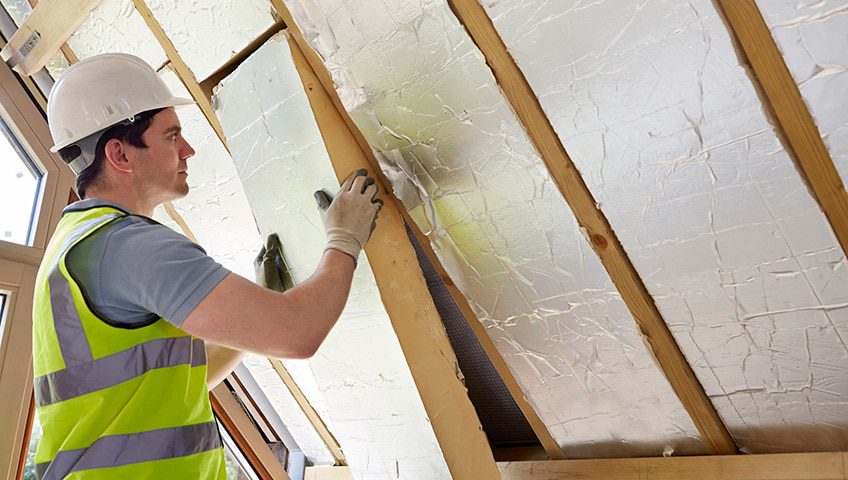Optimal building performance in the commercial sector relies heavily on proper insulation. From energy efficiency and climate control to noise reduction, the benefits of insulation are numerous and integral for a comfortable and productive environment. However, understanding the various types of commercial insulation and their unique features can be complex. This blog post seeks to demystify the process and guide property owners through the selection of the most appropriate insulation solutions for their specific needs.
Understanding Insulation for Commercial Properties
Insulation in a commercial building can be described as the unseen yet essential barrier that controls heat flow, contributing to a comfortable and energy-efficient environment. It’s not just about maintaining the right temperature; effective insulation also has a significant role in reducing external noise levels, making the indoor environment more conducive to work. Yet, many property owners find themselves grappling with the complexities and nuances of different insulation options. The myriad of choices, each with its own benefits and considerations, often complicates the decision-making process.
Different Types of Insulation: Benefits and Considerations
When it comes to commercial insulation, there are several types to consider, each offering distinct advantages and suitability for various applications.
Blanket Batt and Roll Insulation
This is one of the most common types of insulation, known for its versatility and cost-effectiveness. Blanket batt and roll insulation can be made from fiberglass, mineral wool, plastic fibers, or natural fibers. It fits snugly between wall studs, floor joists, and ceiling rafters, providing a decent level of thermal resistance. Still, its performance can be compromised if not installed properly, and it may not be the best option for spaces with many pipes, wires, or other obstructions.
Spray Foam Insulation
A highly effective insulator, spray foam expands to fill cracks and voids, creating a tight air seal that significantly reduces energy loss. Its high R-value (thermal resistance rating) and flexibility make it a popular choice for commercial insulation. On the flip side, spray foam insulation requires professional installation, and it tends to be more expensive than other options.
Blown-In Insulation
Consisting of small particles of fiber, foam, or other materials, blown-in insulation is a great option for adding insulation to existing structures or hard-to-reach areas. Its primary advantage is that it provides a seamless barrier against heat and cold. Nevertheless, it requires special equipment for installation and, as with spray foam, is best left to professional installers.
Reflective or Radiant Barrier Insulation
Primarily used in attics, reflective insulation works by reducing the heat gain from radiant energy. It’s more effective in hot climates and works well to supplement other insulation types. Yet, its effectiveness can be compromised by dust accumulation, requiring regular cleaning.
Rigid Panel Insulation
Rigid panel insulation offers high insulating value for minimal thickness, making it ideal for areas where space is at a premium. Though, it’s more expensive than other types and must be protected from the elements, as it can be damaged by sunlight and moisture.
Challenges Faced by Commercial Property Owners When Deciding on Insulation
Choosing the right insulation involves more than understanding the different types available. Commercial property owners often face several challenges in this process. One common challenge is a lack of technical knowledge about insulation materials and their properties. This can make it difficult to determine which type would be most suitable for their specific requirements. Budget constraints often play a crucial role in the decision-making process. While higher-quality insulation might offer better long-term energy savings, the upfront cost can be prohibitive for some businesses.
The size and complexity of commercial buildings can also pose a challenge. Certain types of insulation may be more suitable for large-scale applications or buildings with complex architectural designs. Lastly, compliance with building codes and environmental regulations can impact insulation choice. Property owners need to ensure that their chosen insulation complies with local regulations while also considering the insulation’s environmental impact.
The Rising Trend of Professional Guidance in Insulation Selection
With these complexities in mind, it’s no surprise that a growing trend among commercial property owners is seeking professional guidance when choosing insulation. Commercial insulation contractors offer invaluable expertise, helping businesses make informed decisions that balance cost-effectiveness, energy efficiency, and regulatory compliance.
A reliable commercial insulation company will have access to a wide range of high-quality materials and can guide you towards the most appropriate options for your specific needs. They can help you understand the implications of your choices, from upfront installation costs to long-term energy savings and maintenance requirements.
Furthermore, using commercial insulation contractors can be a cost-efficient solution in the long run. With their professional expertise, they can ensure proper installation, reducing the risk of errors that could compromise your insulation’s performance and necessitate costly repairs down the line.
Finally, hiring the best commercial insulation company offers scalability. Regardless of your project’s size or complexity, these professionals can effectively handle the job, ensuring your building is well-insulated and energy-efficient.
Actionable Advice for Property Owners Considering Insulation Companies
If you’re considering engaging a commercial insulation company, here are some steps to guide you:
Start by researching and comparing different companies. Look for customer reviews, company credentials, and their portfolio of past projects. During consultations, don’t hesitate to ask specific questions about their services. Find out about the types of insulation they recommend and why, how they handle installation, and what warranties or guarantees they offer. Additionally, discuss your budget and long-term expectations. The best commercial insulation company will work with you to find a solution that suits your needs without compromising quality or efficiency.
Choosing the right insulation for your commercial property can be a complex task, with numerous factors to consider. However, with the right guidance from professional commercial insulation contractors, it’s a decision that can significantly enhance your building’s comfort and energy efficiency. Always remember, the investment you make today in insulation will reap dividends in the form of lower energy bills and a more comfortable indoor environment for years to come.



































